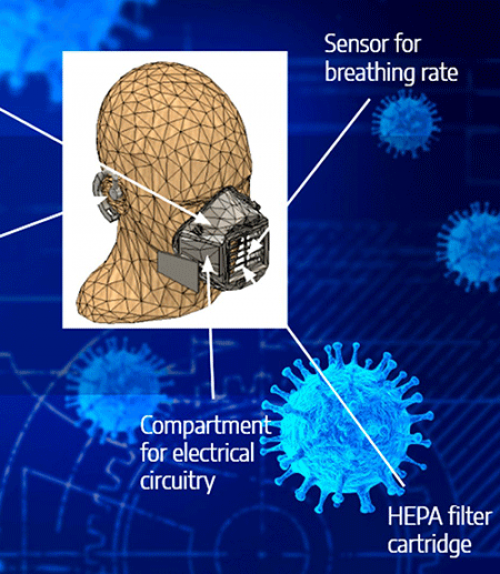In February, Longsha Liu ’21 was well aware that COVID-19 was coursing through China and around the world.
His mother had been giving him regular updates about the virus’s spread in China, where most of his immediate family live – including his 77-year old grandmother, who continued to practice as a physician.
So when Liu, a biological sciences major, and several classmates entered a health care business plan competition, they knew they wanted to target COVID-19. “The main motivation for me was, if there was something that we could do to contribute to a solution, then I wanted us to do it,” Liu said.
“If we were going to come up with an idea,” said teammate Jason Chen ’22, also a biological sciences major, “this would be the best problem to solve at the moment.”
Several team members knew each other from Cornell University Biomedical Device, a student group that works on biomedical device innovation.
They used their experience with biosensors to come up with the winning idea at the seventh annual AI Health Hackathon, Feb. 7-9: a “smart” respiratory mask that prevents the spread of airborne diseases while monitoring the wearer’s vital signs.
Hosted by Weill Cornell Medicine’s Clinical & Translational Science Center in New York City and co-sponsored by Entrepreneurship at Cornell, the hackathon brought together students, research scientists and innovators from Weill Cornell Medicine, the Ithaca campus and Cornell Tech to improve patient care by harnessing artificial intelligence and machine learning. Two dozen teams comprising 140 students vied for $7,500 in prizes.
The team’s VitalMask, made of 3D-printed resin, places sensors near the wearer’s earlobes, nose and mouth to monitor body temperature, heart rate, blood oxygen levels and respiratory rate. “These vital signs are transferred in real time to a mobile or desktop app,” said Kristin Ong ’21. “Not only does the mask help busy medical personnel prioritize patients, it also offers a washable, reusable alternative to standard disposable masks.”
Several of the 60 mentors at the hackathon encouraged the team to explore their idea in the context of emergency room overcrowding, a global problem that the pandemic has exacerbated.
“You’ve got cases in the U.S., in China and Italy, of patients going to the emergency room and spending many hours in the waiting room because they have been prioritized as non-emergency or noncritical care,” said Chen. “There are hundreds of people waiting, and you don’t know who has the coronavirus or not.”
The team – Chen, Liu, Ong, Ray Wei ’21 and Allison Fleisher ’21 – won the grand prize of $2,000 and a $500 third-place win in a special category, sponsored by IBM, for coronavirus innovations.
In April, with the help of a few of the hackathon mentors, Chen, Liu, Ong and Wei formed a startup, Vita Innovations. The company now includes Julia Isakov ’21, Sarah Luo ’20, Daniel Stabile ’21 and Rishi Singhal ’21.
They have filed for provisional patents through patent attorney Erik Huestis ’03, who is on Entrepreneurship at Cornell’s advisory council. And they’re perfecting the design and reaching out to manufacturing partners. “Our main goal is to hopefully enter the market within a year or two,” said Chen, the company’s chief technology officer.
Cornell-affiliated mentors such as Felix Litvinsky, managing director of Blackstone LaunchPad powered by Techstars, part of Entrepreneurship at Cornell, have given them valuable advice on how to move forward, said Ong ’21, the team’s innovation director. “That has been a major contributing factor to our success so far,” she said.
The team hopes to eventually create a line of sensing devices that could have applications beyond the pandemic, in countries with limited health care infrastructure.
“If you consider stroke patients, simply saving a few minutes for taking of vitals could be very significant,” said Liu, Vita Innovations CEO. “VitalMask can also be used for ambulances, and any sort of emergency situation in which you want to get vitals measured but don’t have the time to do so.”
Read the story in the Cornell Chronicle.




